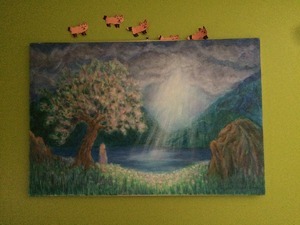Ghost squirrels, one-star reviews, and representation
When my daughter was three, she decided that the painting on her wall had to go. After some difficulty, I finally got from that she thought a ghost squirrel had run across the painting and ruined it. Then I came up with the idea of making little paper foxes - her favorite animal at the time - guard the painting. After that she was willing to sleep in her room with the painting up.
I was thinking the story would make an intersting children's book. If you ask my daughter about it today, she will tell you that it was a shadow that crossed the painting, not a ghost squirrel. Stories change so much depending on who is telling them and when. It got me to thinking about who owns a story.
A few weeks ago, Julia Bouwsma gave a Zoom talk via the Bangor Public Library called EXCAVATING THE MIDDEN. She said something to the effect that retelling a story can be as traumatizing to those who are connected to it as the actual events. As I delve into non-fiction writing for my family history book, I've started to think about who those stories belong to and how to tell them respectfully.
In my push to re-publish Wolf Creek, I read a one-star review of it on Amazon. The reviewer was kind enough to point out that the writing itself was competent. It was the content that aggravated the reviewer who made a list tropes that Wolf Creek is unfortunately guilty of. Writing from the POV of a gay male was something I really struggled with. The review reminded me that as much as I may try to put myself in the shoes of a character, I am limited by my own perspective.
I think that's why it's so important to push for representation in publishing. Think of all the perspectives and experiences we are missing having a largely white, cis-male authorship. But here's the thing, we don't get books from those authors unless publishers think they can make money. So I'm trying to make an effort to bring diversity of authors to my library shelves. It feels like a contrived effort, because it is. But I think about Buddha's hierarchy of actions. Change starts with small, forced steps. Right actions can lead to right thought.




